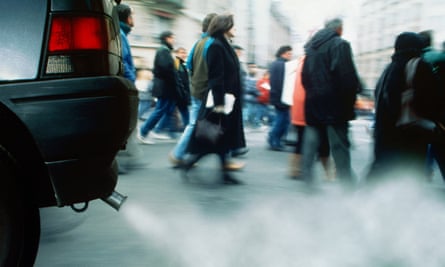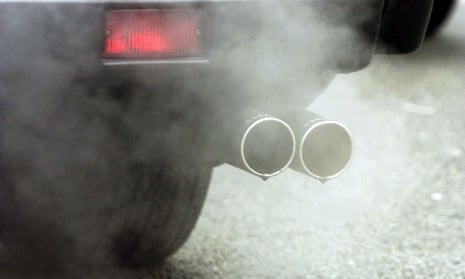More than a thousand diesel cars have been caught without an essential pollution filter that traps deadly particles, according to government figures. But experts warn the rogue practice of removing the filters, which contributes to air pollution-related deaths, could be far more widespread.
Almost 29,000 people die prematurely each year in the UK owing to particle pollution, causing £15bn in health costs. Since 2009 diesel particulate filters (DPFs) have been compulsory in new diesel cars. But, particularly for cars driven in cities, the DPFs can become clogged and cause breakdowns.
Replacing DPFs usually costs more than a £1,000 and, as a result, many garages across the country offer to remove the filter completely for a few hundred pounds. Removing the filter is not illegal, but driving a car without a DPF is an offence and particle emissions from the exhaust pipe are likely to soar fivefold as a result.
In 2014, ministers said the “unacceptable” practice was “clearly detrimental to people’s health” and introduced a visual check into the MOT. This has caught 1,188 vehicles so far, according to figures given to the Guardian by the Department for Transport (DfT).
However, many garages offer to circumvent the visual check by, for example, by “discreetly cutting a small window in the top of the chamber, removing the internal filter before rewelding the window and refitting to the vehicle. This way the vehicle still appears to have a DPF fitted and … will have no affect on your MOT.” Garages also claim removing the DPF will increase power and fuel efficiency, with one promising “your engine will breathe again”.
Simon Birkett, director of Clean Air in London (CAL), said: “The thought of raw and carcinogenic diesel exhaust being spewed on to our high streets is terrifying. The diesel catastrophe, worsened by DPF removal, will affect the health of everyone in the UK.”
He added: “CAL estimates that tens of thousands and more likely hundreds of thousands of diesel vehicles have been tampered with in this way. As more and more vehicles come out of warranty and parts wear out, this problem will grow.”
Dave Garratt, chief executive at the Garage Equipment Association, said: “[DPF removal] has been going on for a long time and it is probably getting progressively worse. The biggest hole in the MOT is that they don’t really check it. [Visual inspection] does not actually tell you if there is a core in the canister. I’d guess there are a lot more out there.”
One garage owner, who has now stopped removing DPFs and did not want to be named, said: “We were inundated with vehicles with DPF problems. Removal was the quick fix.”
The roads minister, Andrew Jones, said: “We are fully committed to improving air quality and the new figures are proof that our common-sense changes to the MOT test are helping get hundreds of polluting vehicles off the road. We continue to tackle harmful vehicle emissions and are investigating ways to use the latest technology to further improve detection methods.”
The DfT has commissioned research on how existing or new technology can be used to detect DPF removal by measuring exhaust fumes. One possibility is adapting the use of the equipment that performs the current MOT smoke test to make it more sensitive. The findings may be implemented as part of changes to the Roadworthiness Directive, which sets the framework for MOT testing, and is scheduled to be introduced in the UK in 2017-18.
However, ministers face calls for more urgent action. “It is such a clear cut issue,” said Patrick Streeter, an elected councillor in the City of London Corporation, who has taken up the issue with the police. “They have to get out there and arrest these people. They need to raid the garages to collect the registration numbers [of the cars that have had DPF removed]. The pollution is absolutely terrible.”

Cleaning the DPF is possible and usually costs less than replacement but more than removal. Ceramex is one company offering the service and its managing director, Rob Rule, said DPF removal was undercutting action by politicians and car makers to improve the UK’s poor air quality.
“It drives me absolutely bonkers,” he said. “Not only is it immoral and illegal, you are undermining so much cost and effort that is going into cleaning up the environment. It is antisocial.”
Rule backed calls for a further crackdown on DPF removal, saying: “If there is one thing that could improve air quality in [cities], it would be to send the police to garages to tell them they are committing a criminal act, then go back if they don’t change their act.”
In October, police in Spain raided a string of garages which were allegedly performing DPF removal, while in the US in 2013, a company agreed to pay a $500,000 (£350,000) fine for DPF-related violations.
Birkett said: “The UK government must outlaw the removal of DPFs, modernise and mandate the testing of exhaust emissions during the MOT and introduce random on-road testing.” Spot checks used to take place in the UK but were stopped in 2011, with the government saying they had unearthed only two problems in a decade and that anti-pollution funding was better spent elsewhere.
DPF removal services are widely advertised across the UK. The Guardian contacted five garages offering the service on their websites. Two claimed their websites were out of date but did not subsequently update them. Two said managers would call back, but they did not. One said the service was offered only to off-road vehicles, though the website made no mention of this caveat.
Experts said DPF removal could invalidate car insurance if not declared and that the vehicle inspections offered by motoring organisations to prospective car buyers were visual checks only.
The notice issued to MOT testers in 2014 said: “The DPF plays an essential environmental role in enabling reductions in emissions, reducing air pollution and thereby improving health quality.”

Comments (…)
Sign in or create your Guardian account to join the discussion